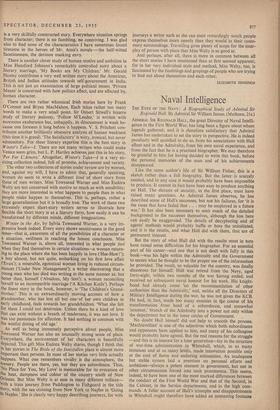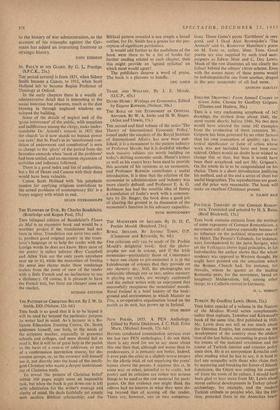Naval Intelligence
THE EYES OF THE NAVY: A Biographical Study of Admiral Sir Reginald Hall. By Admiral Sir William James. (Methuen, 21s.) ADMIRAL SIR REGINALD HALL, the great Director of Naval Intelli- gence in the First World War, has long been a figure about whom legends gathered; and it is therefore satisfactory that Admiral James has undertaken to set the story in perspective. He is indeed peculiarly well qualified to do so, from his associations with Hall afloat and in the Admiralty, from his own naval experience, and from the fact that he is a practised biographer. We may therefore be grateful to him for having decided to write this book, before the personal memories of the man and of his achievements disappeared.
Like the same author's life of Sir William Fisher, this is a sketch rather than a full biography. But the latter is scarcely needed, and in any case it would probably have been impossible to produce. It cannot in fact have been easy to produce anything on Hall. The dictates of security, in the first place, must have raised many questions. As Admiral James observes, he has described some of Hall's successes, but not his failures, for `it is the ruses that have failed that . . . may be employed in a future war.' It has also been necessary to omit much of the detailed background to the successes themselves, although the loss here can easily be exaggerated. The details of decyphering and of agents' methods would probably baffle or bore the uninitiated, and it is the results, and what Hall did with them, that are of permanent interest.
But the story of what Hall did with the results must in turn have raised some difficulties for his biographer. For an essential part of his career—and one that is not dealt with fully in this book—was his fight within the Admiralty and the Government to secure what he thought to be the proper use of the information he provided. The result, so valuable for the country, was finally disastrous for himself. Hall was retired from the Navy, aged forty-eight, within two months of the war having ended, and received no subsequent naval honour for his work. His knight- hood had already come 'on the recommendation of other authorities than the Admiralty,' and, unlike all the Directors of Military Intelligence during the war, he was not given the KCB. He had, in fact, made too many enemies in the course of his transformation from head of a subordinate, and somewhat 'amateur,' branch of the Admiralty into a power not only within the department but in the inner circles of Government.
No doubt Hall himself did not help to smooth the process. 'Machiavellian' is one of the adjectives which both subordinates and opponents have applied to him, and many of his colleagues would probably have agreed. But the real reasons for the struggle —and this is its interest for a later generation—lay in the structure of war-time administration in Whitehall, which, in so many instances and at so many levels, made innovation possible only at the cost of fierce and enduring animosities. An inadequate but stable system laid a premium on personal efforts and ambitions—always a potent element in government, but not in other circumstances forced into such prominence. This seems, indeed, to have been one of the most marked differences between the conduct of the First World War and that of the Second, in the Cabinet, in the Service departments, and in the high com- mands. A fuller account of Hall's triumphs and disappointments in Whitehall might therefore have added an interesting footnote to the history of war administration, as the account of his triumphs against the Ger- mans has added an interesting footnote to strategic history.
JOHN EHRMAN



































 Previous page
Previous page